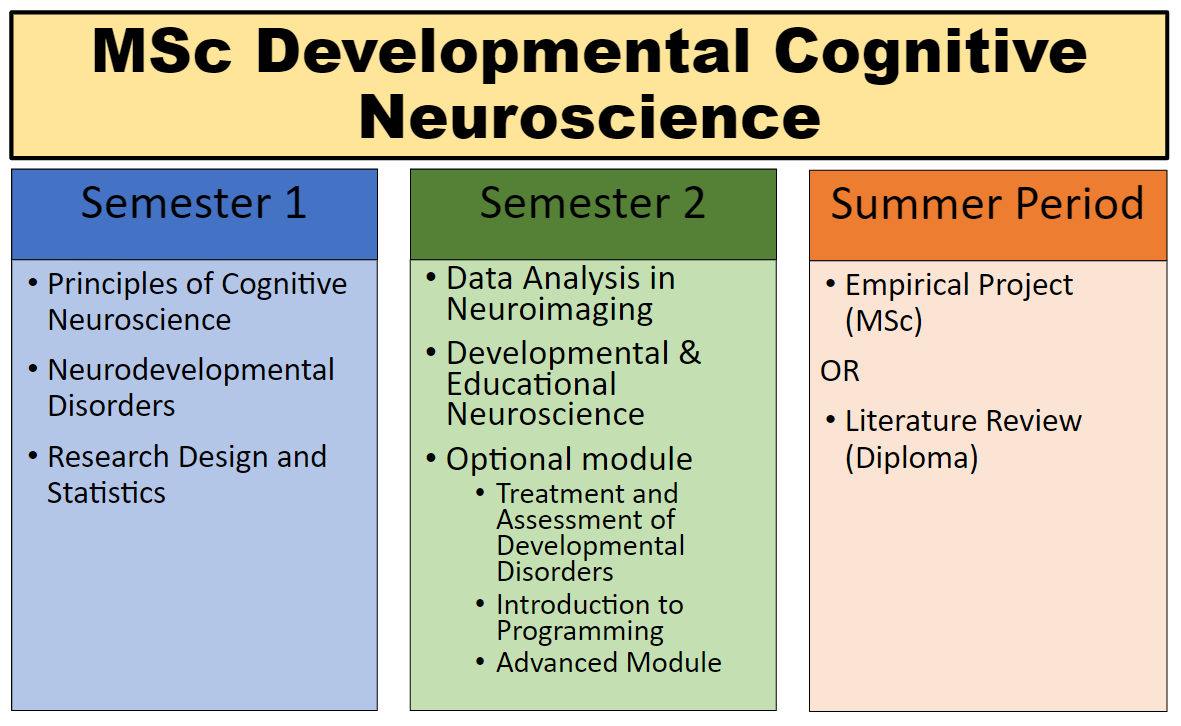MSc Developmental Cognitive Neuroscience - Course Overview
Course Director: Dr Silke Göbel
Introduction
Developmental Cognitive Neuroscience is an exciting and established sub-field that lies between the parent disciplines of cognitive neuroscience and developmental psychology. The MSc in Developmental Cognitive Neuroscience combines theoretical and empirical grounding in the cognitive and biological mechanisms of developmental change with training of the analytical and practical skills required for undertaking research into cognitive development and its neural bases. The course provides perspectives from developmental cognitive neuroscience and cognitive psychology as well as hands-on training in imaging methods. Topical issues in developmental cognitive neuroscience will be covered, including the neural bases of perceiving and acting in the physical and social world and Neuroeducation.
Course Aims
- To lead students to an understanding of research methods, research techniques and a range of different approaches to data analysis that underpin human developmental cognitive neuroscience.
- To provide students with knowledge of the main issues in developmental cognitive neuroscience.
- To provide students with specialist knowledge in particular areas of brain imaging, developmental psychology, research methods and data analysis.
- To provide students with hands-on training in neuroimaging methods relevant for developmental research
- To help students to develop a range of scientific skills based on an understanding of the principles of psychology. These include hypothesis testing, the use of methodologies to design and conduct empirical research, information handling, data analysis and the critical evaluation of empirical data.
- To prepare students for working with children in a neuroscientific setting
- To provide students with opportunities to acquire transferable skills in team working, problem solving, leadership, research and effective communication (both written and spoken), so as to allow access to PhD programmes in Human Neuroscience, Developmental Psychology, and Experimental Psychology and related disciplines and to facilitate access to a broad range of employment opportunities.
Overview
During semester 1 you will take two specialist modules and one generic module which is taken by all Master students: Research Design & Statistics. In the specialist module on Principles of Cognitive Neuroscience an introduction to the ways cognitive neuroscientist study the brain will be given, while in the specialist module Neurodevelopmental Disorders you will learn about the cognitive and biological manifestations of neurodevelopmental disorders such as reading impairments, dyscalculia and autism.
In semester 2 there will be two specialist modules and an optional module. Data Analysis in Neuroimaging will give you the skills required to design your own neuroscientific study and to analyse neuroscientific data. In the specialist module Developmental & Educational Neuroscience key findings from developmental neuroscience and their potential applications to education will be discussed. For the second specialist module you can choose a module from a range of optional modules:
- Assessment and Treatment of Developmental Disorders
- Introduction to Programming
- Animal Cognition and Communication
- Social Cognitive Development
- Face Perception
- Drug Addiction
- Fear and Survival
- Applications of Forensic Psychology
- Cyberpsychology
- The Cognitive Neuroscience of Anxiety and Trauma
- Perception of Actions and Human Behaviour
- The Transition to Parenthood
- Memory and the Brain
- Microanalysis of Communication
- Human Risk
- The Neurobiology of Depression
- Forensic Psychology in Practice
- Adult Mental Health: Schizophrenia and Psychoses
- Clinical Research Methods
The summer period will be spent on your own empirical project: collecting data, analysing the data, interpreting the results and writing your project report. Finally, you will also produce a poster presenting the results of your project.
Empirical Project (MSc Requirement)
During the summer period you will be given the opportunity to undertake a novel piece of empirical work, on a topic at the cutting-edge of research in cognitive developmental neuroscience. The Empirical Project enables students to participate in the design and implementation of a theoretically-motivated piece of pure or applied research in developmental neuroscience providing hands-on training in brain imaging or other cognitive, developmental and/or neuroscientific methods. Topics are chosen so as to be timely and practicable within the relevant resource and time constraints. We regard it as important that the topic not only engages the interest and enthusiasm of the student, but is also a good match to the specialist expertise and knowledge of the supervisor. Students should expect to acquire the ability to develop an idea that is both interesting and capable of being studied experimentally, and design and carry out the study in a scientifically satisfactory manner. Further, students will gain an understanding of statistical and analytic techniques, and learn the use of computer programs commonly used in psychological research. The empirical project will also assess the student's ability to write a comprehensive literature survey that critically reviews the relevant literature.
Literature Review (Diploma Only)
The opportunity to work towards a Diploma qualification is offered to students whose work does not reach the standard of a MSc qualification. For these students, a literature review is required in place of an empirical project. The literature review aims to teach Diploma students to critically appraise and write about a specific issue in cognitive neuroscience. Through this assignment, students will demonstrate an ability to think and write about an issue in their chosen field of study in an insightful and educated way. The literature review takes place during the summer period.
Related content
To contact the Student Documentation maintainers please email psychology-student-docs-group@york.ac.uk (use your University of York email address).
